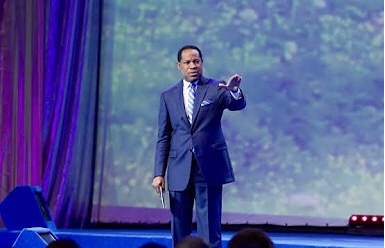If you understand the concept of prayer, you will understand that prayer flows from this physical world up to a spiritual or heavenly world. This means someone who has crossed over to a spiritual world and has left this physical world cannot pray for you, and as we study the scriptures on this, you will begin to understand this. In the Old Testament, the high priest was told to burn incense on behalf of the people every morning.
And Aaron shall burn thereon sweet incense every morning: when he dresseth the lamps, he shall burn incense upon it.
Exodus 30:7 KJV
Incense in those days was in the form of a stick, a special type of stick that let out perfume or a sweet smell when it’s being burned. The priest will place this stick in a golden bowl called a censer, and then light the stick up with fire and allow it to burn. The smoke then begins to ascend upward. All these were done by the priest right inside the Tabernacle in the section of the tent called the Holy Place. The holy place is the place you have to pass to get to the most holy section of that tabernacle, where the blood of animals was presented and poured on the altar.

So we see that in the Old Testament, incense was done by the priest.
according to the custom of the priesthood, [a]his lot fell to burn incense when he went into the temple of the Lord.
And the whole multitude of the people was praying outside at the hour of incense.
Luke 1:9-10 NKJV
It was a practice that was figuratively trying to describe prayer, but such a practice of physically burning incense has been done away with in Christ, but unfortunately, up to date, some Christians still burn incense as a form of praying to God; not knowing incense praying in the Old Testament is trying to describe the prayers we do with our lips today.
Kind David, being a prophetic man, knew that incense was used figuratively to refer to prayers done with our lips; he wrote it down in the book of Psalms below.
Lord, I cry unto thee: make haste unto me; give ear unto my voice, when I cry unto thee.
Let my prayer be set forth before thee as incense; and the lifting up of my hands as the evening sacrifice.
Psalm 141:1-2 KJV
So you see, David describes prayer today as that physical stick of incense the priest used to burn, in which the smoke ascended from the earth towards heaven. Now coming back to the book of the New Testament; Apostle John received a prophetic vision from the Lord. And in that vision, incense was still described as the prayers of the saint. Let’s see this below.
And the smoke of the incense, which came with the prayers of the saints, ascended up before God out of the angel’s hand.
Revelation 8:4 KJV
Most of the praying we do are collected by angels. So we see that the prayers of the saint are like a smoke of incense ascending from the earth to heaven, or unto God. So here you have it: the incense burning practice from the Old Testament was done on earth. It wasn’t done outside the earthly realm; the smoke from the incense moved from the earth towards the sky, and again, incense burning figuratively describes our praying today as Christians.
We don’t have to burn any physical incense like most religion do; the praying or prayers from our lips are the incense!!! So the Bible never said someone in heaven should burn incense to God, but rather, from the book of the Old Testament, we saw that it was men on earth that burned incense unto the Lord, and the smoke ascended to the sky. Again, incense figuratively describes prayer here, so asking someone who has gone to heaven to pray for you is like trying to burn incense in heaven.
Prayers have always been from Earth, and then its destination is to travel to God. Someone who is in heaven cannot pray for you; it will not work even if they try. To have the license to pray, you must dwell in the physical realm. Once you are not in this realm again, you have lost that license. Now someone may ask, But Jonah Kingsley, how about Jesus Christ? And that leads us to the intercession of christ.
The Intercession Of Christ For Us
Did the Bible not say Jesus is in heaven praying for us? To answer this, let’s look at the very scriptures where this misconception is coming from. Let’s study that verse in detail below:
Wherefore he is able also to save them to the uttermost that come unto God by him, seeing he ever liveth to make intercession for them.
Hebrews 7:25 KJV
From this Very Verse 25. It speaks about the eternal salvation we have in Christ and how once you are saved in Jesus, you are saved forever, and this is because Jesus ever liveth to make intercessions for us. If care is not taken, we may be tempted to assume that the intercession being done here is Jesus praying, but that is not true at all. One of the rules of Bible interpretation is to allow scripture to interpret scripture and never assume what a verse of scripture is trying to say. You should understand that before verse 25 came into play above, the writer’s discussion about this did not start from 25.
The discussion started from verse 1 of Hebrews chapter 7 and continued with the previous verses that came before verse 25. The Jewish people, or Hebrew people, refused to accept the high priestly ministry of Jesus, and their reason for rejecting the high priestly ministry of Jesus was that he was not a Levite, and in those days, it was only from the tribe of Levite men that were chosen to occupy the offices of a high priest or priest. If you are not from the Levite tribe, you cannot be chosen to be a priest or high priest.

But the Levites have no part among you; for the priesthood of the Lord is their inheritance: and Gad, and Reuben, and half the tribe of Manasseh, have received their inheritance beyond Jordan on the east, which Moses the servant of the Lord gave them.
Joshua 18:7 KJV
So the priesthood of the Lord was like the inheritance meant for only the tribe of Levi, so every Levite was a priest to the Lord. The priesthood did not come from any other tribe except the tribe of Levi. This was the argument that the Jews or Hebrews had, not wanting to accept Jesus Christ’s high priestly ministry; they said Jesus could not be the high priest because he wasn’t from the tribe of Levi but from the tribe of Judah.
So the writer of Hebrew tries to counter this opposition with God’s word by using Melchizedek, the high priest that Abraham saw and gave a tithe to. That Melchizedek was a high priest; he wasn’t from any Leviticus or Levi tribe. No one knew where he was from; he had no mother, father, brother, or sister that anyone knew of, but he was still a high priest regardless, even without belonging to the Levite tribe, because at this time, the 12 tribes of Israel were not in existence.
The Levite tribe are sons of Abraham, as are the rest of the other tribes in Israel. When Abraham met Melchizedek he had no children of his own, so the Levite tribe could not have been in existence. So someone by the name of Melchizedek was a high priest even without belonging to any Levite tribe. As proof that Melchizedek was a high priest, he collected tithe from Abraham, because according to the law, it’s only the Leviticus priest that collected tithe from the people.
So the writer of Hebrew tries to explain this from the previous verses; let’s read below.
For this Melchizedek, king of Salem, priest of the Most High God, met Abraham as he returned from the slaughter of the kings and blessed him,
and Abraham gave him a tenth of all [the spoil]. He is, first of all, by the translation of his name, king of righteousness, and then he is also king of Salem, which means king of peace.
Without [any record of] father or mother, nor ancestral line, without [any record of] beginning of days (birth) nor ending of life (death), but having been made like the Son of God, he remains a priest without interruption and without successor.
Now pause and consider how great this man was to whom Abraham, the patriarch, gave a tenth of the spoils.
It is true that those descendants of Levi who are charged with the priestly office are commanded in the Law to collect tithes from the people—which means, from their kinsmen—though these have descended from Abraham.
But this person [Melchizedek] who is not from their Levitical ancestry received tithes from Abraham and blessed him who possessed the promises [of God].
Yet it is beyond all dispute that the lesser person is always blessed by the greater one.
Furthermore, here [in the Levitical priesthood] tithes are received by men who are subject to death; but in that case [concerning Melchizedek], they are received by one of whom it is testified that he lives on [perpetually].
A person might even say that Levi [the father of the priestly tribe] himself, who received tithes, paid tithes through Abraham [the father of all Israel and of all who believe],
for Levi was still in the loins (unborn) of his forefather [Abraham] when Melchizedek met him (Abraham).
Now if perfection [a perfect fellowship between God and the worshiper] had been attained through the Levitical priesthood (for under it the people were given the Law) what further need was there for another and different kind of priest to arise, one in the manner of Melchizedek, rather than one appointed to the order of Aaron?
For when there is a change in the priesthood, there is of necessity a change of the law [concerning the priesthood] as well.
Hebrews 7:1-12 AMP
So we see, the writer of Hebrew tries to convince them of why they should embrace the high priestly ministry of Jesus. He told them Melchizedek was like the Son of God, which is a figurative description of Christ. That Melchizedek wasn’t from the tribe of Levi, but he was a priest to God. So likewise, Jesus doesn’t necessarily need to be from the tribe of Levi. He was made a high priest; the only high priest now because he was chosen by God after the order of Melchizedek.
The writer of Hebrew further went on to say that in the Old Testament High Priestly Ministry, which was according to the law, they had to keep offering animal sacrifices to make atonement (intercession) for people’s sins, and they did this killing and offering of sacrifice every year, but this Jesus, in fulfilling his High Priestly ministry; he did not use animals as sacrifices. God used him as a sacrifice for all our sins; this Jesus bodily sacrifice doesn’t have to be done yearly like the way the Leviticus priest offered up sacrifices yearly for sin, but rather, Jesus offered himself as a sacrifice and he did this only once and doesn’t need to come every year to die over and over again.
Jesus died once and for all our sins, and because of this once bodily sacrifice of Jesus, all our sins have been atoned for. All our sins are being interceded for; the proof of his intercession for all our sins is the proof that he died and that he is alive again in heaven.
That’s what this very verse was trying to say when it said: He ever liveth to make intercessions for us.
Wherefore he is able also to save them to the uttermost that come unto God by him, seeing he ever liveth to make intercession for them.
Hebrews 7:25 KJV
The Greek word intercession translated here has nothing to do with prayer; it’s from the Greek word ‘entugchanō’ and that word is translated rightly to mean to deal with in favour or against.
So when it says he ever liveth to make intercession, you can also read it this way: He ever liveth to deal with. A better way to help you understand that Greek word is this: When you say someone is dealing with something, the question to ask is, Dealing with what? From verse 25, it already tells us what Jesus is dealing with. Same as interceding for, and that he is the one who is placed in that position to give eternal salvation to all men who believe, once they are saved, they can never be lost again.
This is what Jesus deals with. Jesus deals with a high priestly ministry that is forever; that’s the intercessions that scripture is talking about, because every other high priest chosen amongst men from the tribe of Judah are all dead. Once they die, their high priestly ministry ends, but Jesus is the high priest who will not and cannot die.
That’s why verse 25 says he ever liveth to make intercessions for us, meaning he will live on to be our high priest so that men can have Eternal salvation in Him; this is the intercession. As long as he liveth and he is our high priest, we will have eternal salvation. If Jesus, our high priest, dies in heaven, our salvation is lost, meaning we lost our intercessor; the intercession is not in the praying as people assume it to be but rather in his existence. Do you understand this?
Knowing that Christ being raised from the dead dieth no more; death hath no more dominion over him.
For in that he died, he died unto sin once: but in that he liveth, he liveth unto God.
Romans 6:9-10 KJV
And if Christ be not risen, then is our preaching vain, and your faith is also vain.
1 Corinthians 15:14 KJV
Our salvation can be lost if Christ, who is alive in heaven, can die, but Christ is our salvation, and he cannot die; he lives forever; it means we will have salvation forever; this is the intercession the writer of Hebrew is talking about. He wasn’t referring to Jesus praying for us in heaven. In fact, the next verses that came before this verse 25 explain further about this intercessory ministry of Jesus, and again, it has nothing to do with Jesus praying in Heaven for us.
Let’s read the next verses that came after verse 25 of Hebrews chapter 7.
Wherefore he is able also to save them to the uttermost that come unto God by him, seeing he ever liveth to make intercession for them.
For such an high priest became us, who is holy, harmless, undefiled, separate from sinners, and made higher than the heavens;
Who needeth not daily, as those high priests, to offer up sacrifice, first for his own sins, and then for the people’s: for this he did once, when he offered up himself.
For the law maketh men high priests which have infirmity; but the word of the oath, which was since the law, maketh the Son, who is consecrated for evermore.
Hebrews 7:25-28 KJV
So we see that the intercession of Jesus here is not Jesus praying for us in heaven, but rather the intercession here refers to him being the consecrated high priest forever and will not die. Often times in the Old Testament, the word intercession wasn’t always used for prayers; it is a word mostly used for making atonement for people’s sins so that they will have salvation. When people’s sins were atoned for, it was like an intercession that was being made.
Remember, from the Greek word, intercession means to deal with. Meaning it’s an action done to deal with the sins of the people so that they can be forgiven of their sins. Let’s see all these things from some places in the Old Testament below.
Isaiah 53 speaks about the sufferings of Christ. In the last verse of Isaiah chapter 53 it reads below.
Therefore will I divide him a portion with the great, and he shall divide the spoil with the strong; because he hath poured out his soul unto death: and he was numbered with the transgressors; and he bare the sin of many, and made intercession for the transgressors.
Isaiah 53:12 KJV
Let’s view that from the amplified.
Therefore will I divide Him (Christ) a portion with the great [kings and rulers], and He shall divide the spoil with the mighty, because He poured out His life unto death, and [He let Himself] be regarded as a criminal and be numbered with the transgressors; yet He bore [and took away] the sin of many and made intercession for the transgressors (the rebellious).
Isaiah 53:12 AMP
Intercession here means taking action to deal with sin, so the intercession here made by Jesus is not prayer, but it is Jesus dealing with the sins of sinners or transgressors by taking the blame for all their sins and then suffering and dying the death everyone was supposed to receive. Jesus became the transgressor on the cross who committed all our sins so that all of God’s wrath would fall on him instead of us; this was the intercession of Jesus. And the previous verses of this same verse explain it when he became to explain how Jesus interceded for sinners.
But He was wounded for our transgressions, He was bruised for our guilt and iniquities; the chastisement [needful to obtain] peace and well-being for us was upon Him, and with the stripes [that wounded] Him we are healed and made whole.
All we like sheep have gone astray, we have turned every one to his own way; and the Lord has made to light upon Him the guilt and iniquity of us all.
Isaiah 53:5-6 AMP
So what Hebrews chapter 7:25 was saying has a connection with this because Jesus has dealt with all our sins in his body and because of the fact that he is alive as our High Priest gives us eternal life.
So there is no place in the scriptures that says that Jesus is in heaven praying for us. If Jesus is to pray for you while in heaven, he will have to come through men on earth, meaning he will have to stir up a believer on earth to render up supplication unto God for you. No wonder the scriptures tells us in:
Likewise the Spirit also helpeth our infirmities: for we know not what we should pray for as we ought: but the Spirit itself maketh intercession for us with groanings which cannot be uttered.
Romans 8:26 KJV
So God will stir up men by his spirit to pray for you. GOD WILL TAKE A HOLD OF INDIVIDUALS OR GROUP TO INTERCEDE ON YOUR BEHALF; that’s what that scripture is saying. It did not say Jesus will be in heaven praying for you, but Jesus can use men or stir up a saved brother or sister that is in Christ and that is on this earth to pray for you by His spirit.
Read Also: The Mighty Hand of God: A Sermon That Will Change Your Life and Ministry For Spiritual Growth
Read Also: The Power Of Praying Together [Corporate Praying]
Read Also: [Free Download] Download The Rhapsody Of Realities PDF
I hope you get this now. In fact, the word intercession used in Romans chapter 6:26 is very different from the intercession used in Hebrews chapter 7:25.
In Romans chapter 8:26 the word, “intercession” is from the Greek word “huperentugchanō” and this word means to stand on behalf of another in prayers so that nothing happens to them. While the intercession found in Hebrews chapter 7:25 is from the Greek word “entugchanō,” and this refers to dealing with sin.
And how Jesus dealt with our sins was that he died for our sins, was raised from the dead, and then he is forever alive in heaven as our high priest forever, so that we will have eternal salvation. I hope you get this now?
In summary, it is probably an act of illiteracy or ignorance to ask Mary, Angel Gabriel, or other angels to pray for you in heaven.
In my next article, I will explain why it’s invalid for a saint in heaven to pray for a saint on earth. Trust that this piece has blessed you. If yes, then I am glad.
Credit: Jonah Kingsley





